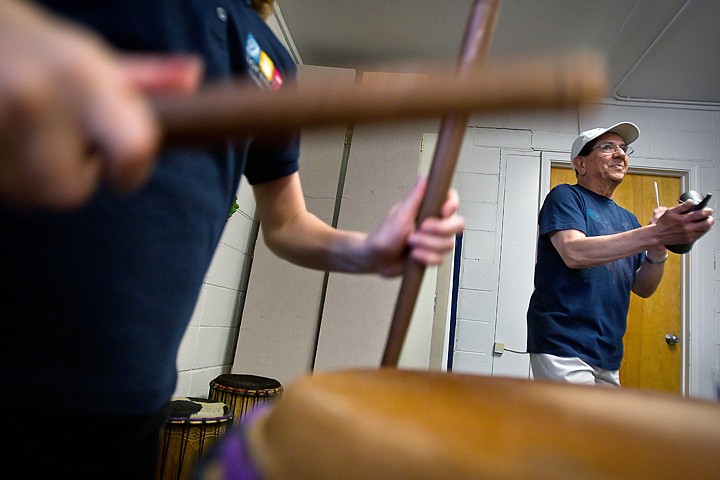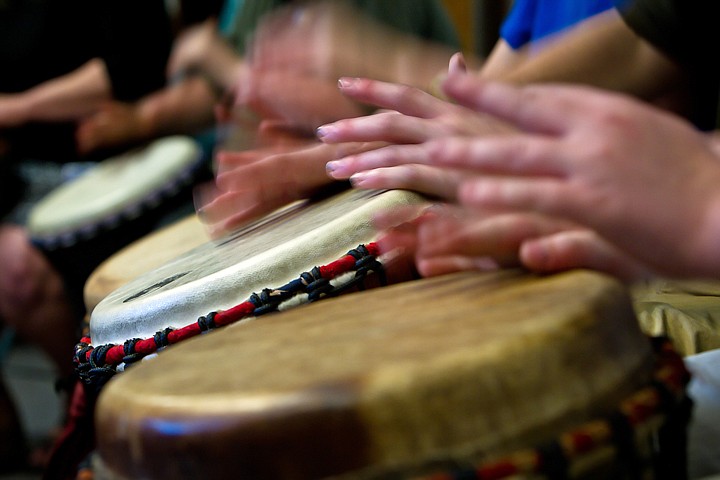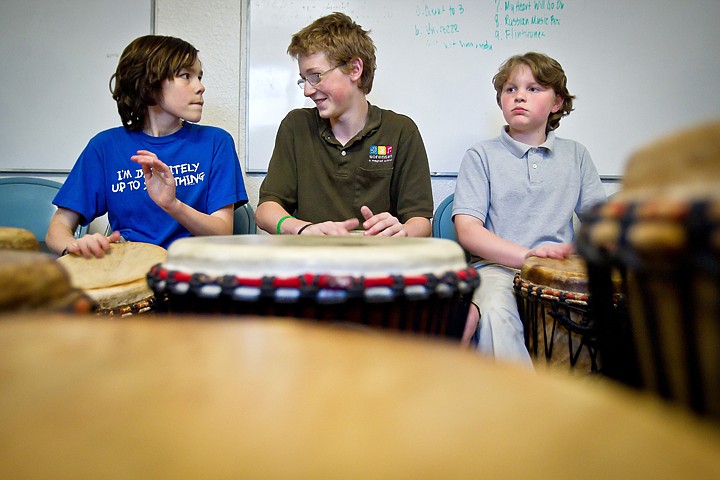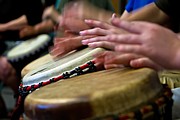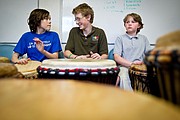Different drummers
MIKE PATRICK | Hagadone News Network | UPDATED 14 years, 5 months AGO
Rolling thunder echoed through the gymnasium, a rhythmic boom that soon had the audience tapping toes, nodding heads, strumming fingers on thighs.
Suddenly, as if from a hidden cliff, somebody opened fire.
It was a machine gun burst, only it kept firing. It fired so fast that members of the audience looked at one another, wondering where it was coming from.
It kept firing.
In a moment or two the audience realized the source of the machine gun was a child's fingertips. Almost unnoticed, the boy had inched forward from the line of young drummers and, like a spaceship in hyperdrive, instantly exceeded a speed barrier that had seemed unbreakable. All the additional movement was in his hands.
Nobody was picketing outside Lakes Magnet Middle School on this late May Saturday morning during the inaugural Multicultural Faire. No meetings of angry citizens were being organized, no op-ed pieces or My Turn columns being penned.
Yet this troupe of African tribal drummers called the Makena Performers represented a Coeur d'Alene School District educational option that transcends traditional readin', writin' and 'rithmetic. The kids are students at Sorensen Magnet School for the Arts and Humanities - one of seven Coeur d'Alene district "schools of choice."
The audience was into it. Before them, the drums roared, the performers relishing their 15 minutes in the spotlight.
•••
As a young American Indian child of Shoshone descent in Wyoming, Sha-Sta (shah-STAY) Lasso was identified as a musical prodigy.
"I wasn't into being a rancher, which is what my parents were," he recalled Thursday after practice in a small room next to the Sorensen gym. "I loved music too much."
He was sent to live with a family in southern California, and in second grade, as the Buddhists say, when the student was ready, the teacher appeared.
Her name was Mrs. Howell.
"She got me playing in the orchestra, playing violin," Lasso said. He smiled. "I remember my mentor and what it meant to me when I was in grade school. That's what I'm doing now."
In growing from mentee to mentor, Lasso, who will turn 70 in October, has left his fingerprints all over the looking glass of the music world.
At age 13 he started playing drums professionally. He later got his big break from Brian Wilson of the Beach Boys, who was familiar with Sha-Sta's prowess with percussions. Wilson called Sha-Sta one day and said a new group was looking for some help that weekend.
Through nine years and five No. 1 hits, Sha-Sta Lasso played as a percussionist for Jay and the Americans, then branched out not just as a musician but as a writer and producer, too.
Along the way he performed with the likes of Sammy Davis Jr., Andy Williams, Carol Burnett, Glen Campbell, Hank Williams Jr., and many more.
While he admits with a laugh that going from the biggest stages in the entertainment world to the little room off the Sorensen gym "has become a little less lucrative," Lasso says there's nowhere he'd rather be right now.
Kids will do that to you. Especially if they're your own.
•••
Makena Performers are the result of a series of dynamic but relatively painless collisions. The traffic director was Sorensen advanced learning teacher Joe Helbling.
In 2007 Helbling was watching a PBS feature on a Spokane-based African drumming group called KuUmba, led by sixth-grade teacher David Casteal. Helbling arranged for Casteal and his drummers to come to Sorensen for an assembly and workshop. As Sorensen was transitioning into a magnet school for arts and humanities, the collision of Casteal, Helbling and a new educational mission was a hit.
"Several kids, not to mention myself, were now motivated to drum so I began a before-school open drum time with our small collection of drums," writes Helbling, now a research assistant at the University of Connecticut.
From that larger pool of drummers Helbling took the most talented kids and practiced twice a week after school, with academic advancement and public performance ultimate goals.
"Our first few performances received positive feedback and one day I was approached by a Sorensen parent, Sha-Sta Lasso," Helbling relates in a synopsis of the program. "I learned that he had a long professional career as a percussionist. He shared my value of music in education and my vision of 'excellence.' He became a friend and mentor to me, and volunteered countless hours to all aspects of the African drumming program at Sorensen."
Two years ago, the mentee handed off the drumstick to the mentor. Lasso's daughter, Stacia, now a Sorensen fifth-grader who plays dun-dunba for Makena, made the Lasso-Helbling merger possible.
•••
Since the 2008-09 school year, Makena has performed dozens of times, including Festival of Trees, Art Walk, and the Idaho Department of Labor groundbreaking ceremony in Post Falls last March, where distinguished guests included Post Falls Mayor Clay Larkin, Gov. Butch Otter and many others.
But Lasso will be the first to tell you that while the performances might be the most visible reward, the invisible ones are more important.
"Academically, not just musically, the growth is phenomenal," he said.
Makena assistant director Kerry Erwin, also a third-grade teacher at Sorensen, said the kids' confidence has soared as they've become better drummers. And that's led to success in the classroom.
"In every way we can link what we teach with real-world applications, they'll assimilate it," she said.
Sixth-grader Lake Edmonson sure has assimilated it - and he's got no shortage of confidence, either.
Lake, who with fellow sixth-grader Logan Cork dazzles audiences with speed and tempo playing djembe, might remind Lasso a little bit of himself. Lake is a violinist who hopes one day to play that instrument professionally. But until then, he's having a blast beating the drum.
"I'd never drummed before but I always dreamed of being up there soloing," he said. "Mr. Lasso has pushed me hard and really helped me become a great drummer."
But it is Logan who could be the poster child for Makena's success. He said the drumming program has changed his life.
"In fourth and fifth grade I was kind of a fit-thrower," he said, acknowledging that the more he got into drumming last year, the more his perspective began to change.
"This year has been kind of great for me," he said. "I've gotten to where I like school now."
Logan also puts much of the credit squarely on Lasso's shoulders.
"He's the person who inspired me," the boy said. "He's one of my favorite people."
Logan's mother, Donna Sellers, confirms the impact Lasso and drumming have had on her son.
"He struggled behaviorally and academically but he's excelling now," she said. "He had his best ISAT score ever this year."
No wonder Sellers calls herself "a huge supporter of the program," which she says has helped transform her son not just into a successful student but "a happy kid."
"Drumming," she said, "was the first thing he ever succeeded at."
•••
Blended into the fabric of schools of choice could be these words penned by Makena's founder, Joe Helbling:
"Some students gained confidence in themselves, some felt a new sense of respect, some found a healthy outlet for their energy, some improved academically, some began to enjoy school more, and some learned that they are capable of more than they had previously imagined. I don't know for certain if these things were a result of the physical act of drumming, or the mental discipline of practice, or their boost in self-efficacy, or their positive relationships with caring adults, but I believe it was some combination of these things.
"I will also say that Makena is an example of what can happen if we search out and value the unique talents of different children and then base our expectations on their ability, not a predetermined minimum standard. I believe that when a person experiences excellence, they will seek it out in other walks of life."
Asked what he would tell skeptics of alternative educational forms, Lasso thought carefully.
"I would say to them, 'Look at the record. See what's happened to the confidence, imagination and creativity in these kids who got involved in the arts.'"
Or in Makena's case, listen to what's happened to them.
That happy music could be the sound of school choice.

